- Home
- Raymond Chandler
The Bronze Door
The Bronze Door Read online
It’s possible, if highly improbable, that some science-fantasy readers are so absorbed in this special field that they do not know the name of Raymond Chandler, universally acclaimed as the King or at least (we’re old Hammett men ourselves) the Crown Prince of the few writers who have raised the hard-boiled detective story to the level of literature. But this most realistic exponent of the simple art of murder could, if he but wished, have as high a reputation among fantasy-readers as among crime-enthusiasts. It is rumored that Mr. Chandler has, purely for his own pleasure, written innumerable fantasies that have never been published or even submitted for publication; certainly the two that he has allowed to appear indicate that he can make the impossible as convincing as any of the all-too-possible criminal cases of private detective Philip Marlowe. We’re happy to revive for you the first of the published Chandler fantasies: a story, as is not surprising, of murder and even of detection, but also a most persuasive presentation of the disturbing thesis that “things might happen to a man, if a man would just let them happen.”
The Bronze Door
by RAYMOND CHANDLER
THE LITTLE MAN was from the Calabar coast or from Papua or Tongatabu, some such remote place like that. An empire-builder frayed at the temples, thin and yellow, and slightly drunk at the club bar. And he was wearing a faded school tie he had probably kept year after year in a tin box so the centipedes wouldn’t eat it.
Mr. Sutton-Cornish didn’t know him, at least not then, but he knew the tie because it was his own school tie. So he spoke to the man timidly, and the man talked to him, being a little drunk and not knowing anybody. They had drinks and talked of the old school, in that peculiar, remote way the English have, without exchanging names, but friendly underneath.
It was a big thrill for Mr. Sutton-Cornish, because nobody ever talked to him at the club except the servants. He was too ingrowing, and you don’t have to talk to people in London clubs. That’s what they’re for.
Mr. Sutton-Cornish got home to tea a little thick-tongued, for the first time in fifteen years. He sat there blankly in the upstairs drawing room, holding his cup of tepid tea and going over the man’s face in his mind, making it younger and chubbier, a face that would go over an Eton collar or under a school cricket cap.
Suddenly he got it, and chuckled. That was something he hadn’t done in a good few years either.
“Llewellyn, m’dear,” he said. “Llewellyn Minor. Had an elder brother. Killed in the War, in the horse artillery.”
Mrs. Sutton-Cornish stared at him bleakly across the heavily embroidered tea cozy. Her chestnut-colored eyes were dull with disdain—dried-out chestnuts, not fresh ones. The rest of her large face looked gray. The late October afternoon was gray, and the heavy, full-bottomed, monogrammed curtains across the windows. Even the ancestors on the walls were gray—all except the bad one, the general.
The chuckle died in Mr. Sutton-Cornish’s throat. The long gray stare took care of that. Then he shivered a little, and as he wasn’t very steady, his hand jerked. He emptied his tea on the rug, almost delicately, cup and all.
“Oh, rot,” he said thickly. “Sorry, m’dear. Missed me trousers, though. Awfully sorry, m’dear.”
For a full minute Mrs. Sutton-Cornish made only the sound of a large woman breathing. Then suddenly things began to tinkle on her—to tinkle and rustle and squeak. She was full of quaint noises, like a haunted house, but Mr. Sutton-Cornish shuddered, because he knew she was trembling with rage.
“Ah-h-h,” she breathed out very, very slowly, after a long time, in her firing-squad manner. “Ah-h-h. Intoxicated, James?”
Something stirred suddenly at her feet. Teddy, the Pomeranian, stopped snoring and lifted his head and smelled blood. He let out a short snapping bark, merely a ranging shot, and waddled to his feet. His protuberant brown eyes stared malignantly at Mr. Sutton-Cornish.
“I’d better ring the bell, m’dear,” Mr. Sutton-Cornish said humbly, and stood up. “Hadn’t I?”
She didn’t answer him. She spoke to Teddy instead, softly. A sort of doughy softness, with something sadistic in it.
“Teddy,” she said softly, “look at that man. Look at that man, Teddy.”
Mr. Sutton-Cornish said thickly: “Now don’t let him snap at me, m’dear. D-don’t let him snap at me, please, m’dear.”
No answer. Teddy braced himself and leered. Mr. Sutton-Cornish tore his eyes away and looked up at the bad ancestor, the general. The general wore a scarlet coat with a diagonal blue sash across it, rather like a bar sinister. He had the winy complexion generals used to have in his day. He had a lot of very fruity-looking decorations and a bold stare, the stare of an unrepentant sinner. The general was no violet. He had broken up more homes than he had fought duels, and he had fought more duels than he had won battles, and he had won plenty of battles.
Looking up at the bold-veined face Mr. Sutton-Cornish braced himself, leaned down and took a small triangular sandwich from the tea table. “Here, Teddy,” he gulped. “Catch, boy, catch!”
He threw the sandwich. It fell in front of Teddy’s little, brown paws. Teddy snuffled it languidly and yawned. He had his meals served to him on china, not thrown at him. He sidled innocently over to the edge of the rug and suddenly pounced on it, snarling.
“At table, James?” Mrs. Sutton-Cornish said slowly and dreadfully. Mr. Sutton-Cornish stood on his teacup. It broke into thin light slivers of fine china. He shuddered again.
But now was the time. He started quickly toward the bell. Teddy let him get almost there, still pretending to worry the fringe of the rug. Then he spit out a piece of fringe, and charged low and soundlessly, his small feet like feathers in the nap of the rug. Mr. Sutton-Cornish was just reaching for the bell.
Small bright teeth tore rapidly and expertedly at a pearl-gray spat. Mr. Sutton-Cornish yelped, pivoted swiftly—and kicked. His neat shoe flashed in the gray light. A silky brown object sailed through the air and landed gobbling.
Then there was a quite indescribable stillness in the room, like the silence in the innermost room of a cold-storage warehouse, at midnight.
Teddy whimpered once, artfully, crept along the floor with his body close to it, crept under Mrs. Sutton-Cornish’s chair. Her purplish-brown skirts moved and Teddy’s face emerged slowly, framed in silk, the face of a nasty old woman with a shawl over her head.
“Caught me off balance,” Mr. Sutton-Cornish mumbled, leaning against the mantelpiece. “Didn’t mean… never intended—”
Mrs. Sutton-Cornish rose. She rose with the air of gathering a retinue about her. Her voice was the cold bleat of a foghorn on an icy river.
“Chinverly,” she said. “I shall leave at once for Chinverly. At once. This hour… Drunk! Filthily drunk in the middle of the afternoon. Kicking little inoffensive animals. Vile! Utterly vile! Open the door!”
Mr. Sutton-Cornish staggered across the room and opened the door. She went out. Teddy trotted beside her, on the side away from Mr. Sutton-Cornish, and for once he didn’t try to trip her in the doorway.
Outside she turned, slowly, as a liner turns.
“James,” she said, “have you anything to say to me?”
He giggled—from pure nervous strain.
She looked at him horribly, turned again, said over her shoulder: “This is the end, James. The end of our marriage.”
Mr. Sutton-Cornish said appallingly: “Goodness, m’dear—are we married?”
She started to turn again, but didn’t. A sound like somebody being strangled in a dungeon came from her. Then she went on.
The door of the room hung open like a paralyzed mouth. Mr. Sutton-Cornish stood just inside it, listening. He didn’t move until he heard steps on the floor above—heavy steps—hers. He sighed and
looked down at his torn spat. Then he crept downstairs, into his long, narrow study beside the entrance hall, and got at the whisky.
He hardly noticed the sounds of departure, luggage being descended, voices, the throbbing of the big car out in front, voices, the last bark from Teddy’s iron-old throat. The house grew utterly silent. The furniture waited with its tongue in its cheek. Outside the lamps were lit in a light fog. Taxis hooted along the wet street. The fire died low in the grate.
Mr. Sutton-Cornish stood in front of it, swaying a little, looking at his long gray face in the wall mirror.
“Take a little stroll,” he whispered wryly. “You and me. Never was anyone else, was there?”
He sneaked out into the hall without Collins, the butler, hearing him. He got his scarf and overcoat and hat on, grasped his stick and gloves, let himself out silently into the dusk.
He stood a little while at the bottom of the steps and looked up at the house. No. 14 Grinling Crescent. His father’s house, his grandfather’s house, his great-grandfather’s house. All he had left. The rest was hers. Even the clothes he wore, the money in his bank account. But the house was still his—at least in name.
Four white steps, as spotless as the souls of virgins, leading up to an apple-green, deep-paneled door, painted as things used to be painted long ago, in the age of leisure. It had a brass knocker and a thumb latch above the handle and one of those bells you twisted, instead of pushing or pulling them, and it rang just on the other side of the door, rather ridiculously, if you were not used to it.
He turned and looked across the street at the little railed-in park always kept locked, where on sunny days the small, prim children of Grinling Crescent walked along the smooth paths, around the little ornamental lake, beside the rhododendron bushes, holding the hands of their nursemaids.
He looked at all this a little wanly, then he squared his thin shoulders and marched off into the dusk, thinking of Nairobi and Papua and Tongatabu, thinking of the man in the faded school tie who would go back there presently, wherever it was he came from, and lie awake in the jungle, thinking of London.
“Keb, sir?”
Mr. Sutton-Cornish halted, stood on the edge of the curb and stared. The voice came from above, one of those wind-husked, beery voices you don’t hear very often any more. It came from the driver’s seat of a hansom cab.
The hansom cab had come out of the darkness, sliding oilily along the street on high rubber-tired wheels, the horse’s hoofs making a slow, even clop-clop that Mr. Sutton-Cornish hadn’t noticed until the driver called down to him.
It looked real enough. The horse had time-worn black blinkers and the characteristic well-fed and yet somehow dilapidated look that cab horses used to have. The half doors of the hansom were folded back and Mr. Sutton-Cornish could see the quilted gray upholstery inside. The long reins were riddled with cracks and following them upward he saw the beefy driver, the wide-brimmed coachman’s “topper” he wore, the huge buttons on the upper part of his greatcoat, and the well-worn blanket that swathed the lower part of him round and round. He held his long whip lightly and delicately, as a hansom driver should hold his whip.
The trouble was that there weren’t any more hansom cabs.
Mr. Sutton-Cornish gulped, slipped a glove off and reached out to touch the wheel. It was cold, very solid, wet with the muddy slime of the city streets.
“Doubt if I’ve ever seen one of these since the War,” he said out loud, very steadily.
“Wot war, guv’nor?”
Mr. Sutton-Cornish started. He touched the wheel again. Then he smiled, slowly and carefully drew his glove on again.
“I’m getting in,” he said.
“Steady there, Prince,” the driver wheezed.
The horse switched his long tail contemptuously. Telling him to be steady. Mr. Sutton-Cornish climbed in over the wheel, rather clumsily, because one had lost the knack of that art these many years. He closed the half doors around in front of him, leaned back against the seat in the pleasant harness-room smell.
The trap opened over his head and the driver’s large nose and alcoholic eyes made an improbable picture in the opening, like a deep-sea fish staring you down through the glass wall of an aquarium.
“Where to, guv’nor?”
“Well… Soho.” It was the most foreign place he could think of—for a hansom cab to go to.
The cabman’s eyes stared down at him.
“Won’t like it there, guv’nor.”
“I don’t have to like it,” Mr. Sutton-Cornish said bitterly.
The cabman stared down at him a little longer. “Yus,” he said. “Soho. Wardour Street like. Right you are, guv’nor.”
The trap slammed shut, the whip flicked delicately beside the horse’s right ear, and motion came to the hansom cab.
Mr. Sutton-Cornish sat perfectly still, his scarf tight around his thin neck and his stick between his knees and his gloved hands clasped on the crook of the stick. He stared mutely out into the mist, like an admiral on the bridge. The horse clop-clopped out of Grinling Crescent, through Belgrave Square, over to Whitehall, up to Trafalgar Square, across that to St. Martin’s Lane.
It went neither fast nor slow, and yet it went as fast as anything else went. It moved without sound, except for the clop-clop, across a world that stank of gasoline fumes, and charred oil, that shrilled with whistles and hooted with horns.
And nobody seemed to notice it and nothing seemed to get in its way. That was rather amazing, Mr. Sutton-Cornish thought. But after all a hansom cab had nothing to do with that world. It was a ghost, an under-layer of time, the first writing on a palimpsest, brought out by ultraviolet light in a darkened room.
“Y’know,” he said, speaking to the horse’s rump, because there wasn’t anything else there to speak to, “things might happen to a man, if a man would just let them happen.”
The long whip flicked by Prince’s ear as lightly as a trout fly flicking at a small dark pool under a rock.
“They already have,” he added glumly.
The cab slowed along a curb, and the trap snapped open again. “Well, ’ere we are, guv’nor. ’Ow about one of them little French dinners for eighteen pence? You know, guv’nor. Six courses of nothink at all. You ’ave one on me and then I ’ave one on you and we’re still ’ungry. ’Ow about it?”
A very chill hand clutched at Mr. Sutton-Cornish’s heart. Six-course dinners for eighteen pence? A hansom cab driver who said: “Wot war, guv’nor?” Twenty years ago, perhaps—
“Let me out here!” he said shrilly.
He threw the doors open, thrust money up at the face in the trap, hopped over the wheel to the sidewalk.
He didn’t quite run, but he walked pretty fast and close to a dark wall and a little slinkingly. But nothing followed him, not even the clop-clop of the horse’s hoofs. He swung around a corner into a narrow crowded street.
The light came from the open door of a shop. CURIOS AND ANTIQUES it said on the façade, in letters once gold, heavily Gothic in style. There was a flare on the sidewalk to attract attention and by this light he read the sign. The voice came from inside, from a little, plump man standing on a box who chanted over the heads of a listless crowd of silent, bored, foreign-looking men. The chanting voice held a note of exhaustion and futility.
“Now what am I bid, gents? Now what am I bid on this magnificent example of Oriental art? One pound starts the ball rolling, gents. One pound note coin of the realm. Now ’oo says a pound, gents? ’Oo says a pound?”
Nobody said anything. The little plump man on the box shook his head, wiped his face with a dirty handkerchief and drew a long breath. Then he saw Mr. Sutton-Cornish standing on the fringe of the little crowd.
“’Ow about you, sir?” he pounced. “You look as if you’d a country ’ouse. Now that door’s made for a country ’ouse. ’Ow about you, sir? Just give me a start like.”
Mr. Sutton-Cornish blinked at him. “Eh? What’s that?” he snapped.
“No offense, sir,” the auctioneer chirped. “If you did ’ave a country ’ouse, that there door might be just what you could use.”
Mr. Sutton-Cornish turned his head slowly, following the auctioneer’s pointing hand, and looked for the first time at the bronze door.
It stood all by itself over against the left-hand wall of the nearly stripped shop. It stood about two feet out from the side wall, on its own base. It was a double door, apparently of cast bronze, although from its size that seemed impossible. It was heavily scrolled over with a welter of Arabic script in relief, an endless story that here found no listener, a procession of curves and dots that might have expressed anything from an anthology of the Koran to the by-laws of a well-organized harem.
The two leaves of the door were only part of the thing. It had a wide, heavy base below and a superstructure topped by a Moorish arch. From the meeting edge of the two leaves a huge key stuck out of a huge keyhole, the sort of key a medieval jailer used to wear in enormous clanking bunches on a leather belt around his waist. A key from The Yeomen of the Guard—a comic-opera key.
“Oh… that,” Mr. Sutton-Cornish said in the stillness. “Well, really, you know. I’m afraid not that, you know.”
The auctioneer sighed. No hope had ever been smaller, probably, but at least it was worth a sigh. Then he picked up something which might have been carved ivory, but wasn’t, stared at it pessimistically, and burst out again:
“Now ’ere, gents, I ’old in my ’and one of the finest examples—”
Mr. Sutton-Cornish smiled faintly and skimmed along the cluster of men until he came close to the bronze door.
He stood in front of it leaning on his stick, which was a section of polished rhinoceros hide over a steel core, dull mahogany in color, and a stick even a heavy man could have leaned on. After a while he reached forward idly and twisted the great key. It turned stubbornly, but it turned. A ring beside it was the doorknob. He twisted that, too, and tugged one half of the door open.

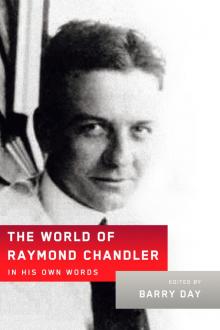 The World of Raymond Chandler: In His Own Words
The World of Raymond Chandler: In His Own Words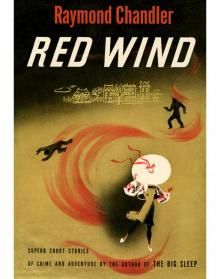 Red Wind: A Collection of Short Stories
Red Wind: A Collection of Short Stories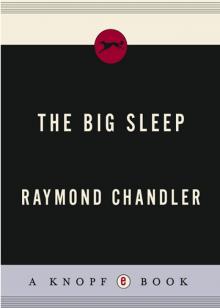 The Big Sleep
The Big Sleep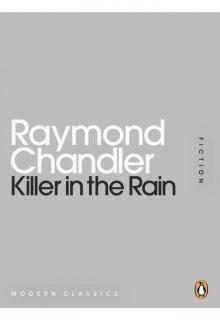 Killer in the Rain
Killer in the Rain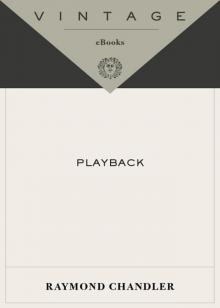 Playback
Playback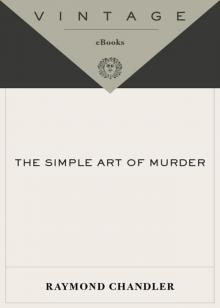 The Simple Art of Murder
The Simple Art of Murder The Bronze Door
The Bronze Door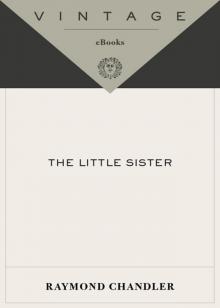 The Little Sister
The Little Sister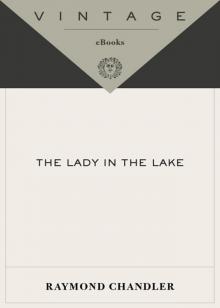 The Lady in the Lake
The Lady in the Lake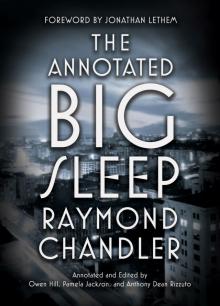 The Annotated Big Sleep
The Annotated Big Sleep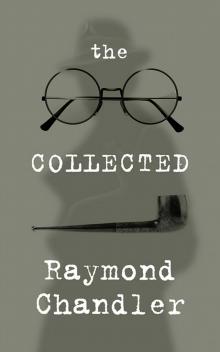 The Collected Raymond Chandler
The Collected Raymond Chandler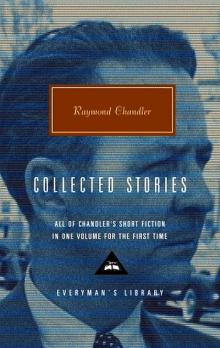 Collected Stories (Everyman's Library)
Collected Stories (Everyman's Library)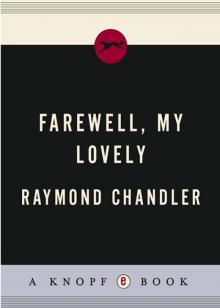 Farewell, My Lovely
Farewell, My Lovely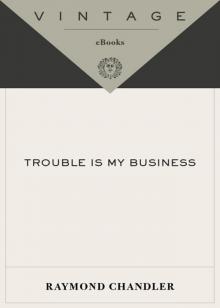 Trouble Is My Business
Trouble Is My Business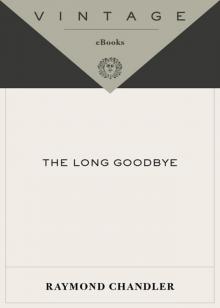 The Long Goodbye
The Long Goodbye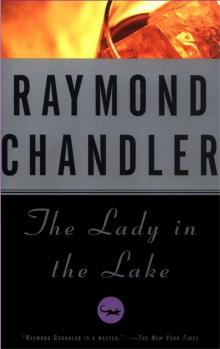 The Lady in the Lake pm-4
The Lady in the Lake pm-4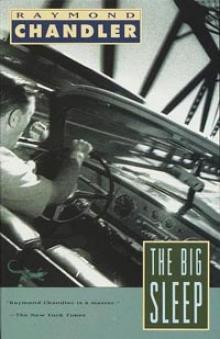 The Big Sleep pm-1
The Big Sleep pm-1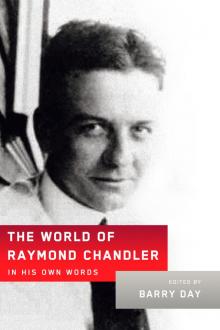 The World of Raymond Chandler
The World of Raymond Chandler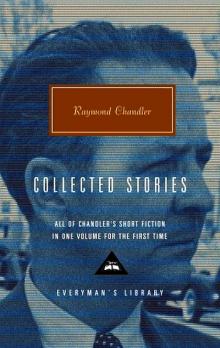 Collected Stories of Raymond Chandler
Collected Stories of Raymond Chandler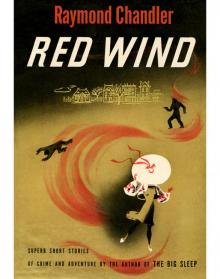 Red Wind
Red Wind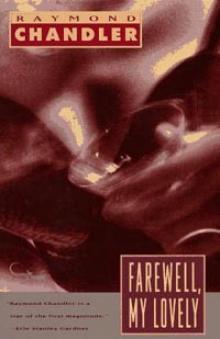 Farewell, My Lovely pm-2
Farewell, My Lovely pm-2 The Raymond Chandler Papers: Selected Letters and Nonfiction, 1909–1959
The Raymond Chandler Papers: Selected Letters and Nonfiction, 1909–1959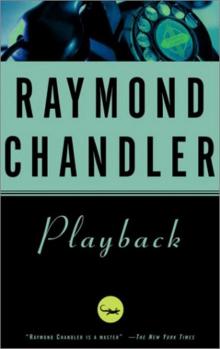 Playback pm-7
Playback pm-7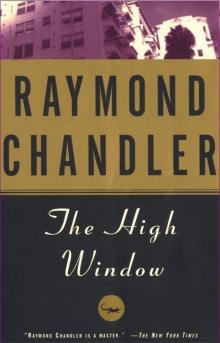 The High Window pm-3
The High Window pm-3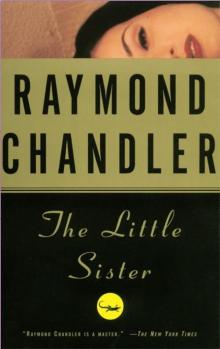 The Little Sister pm-5
The Little Sister pm-5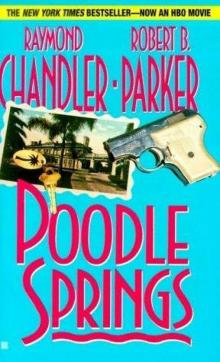 Poodle Springs (philip marlowe)
Poodle Springs (philip marlowe)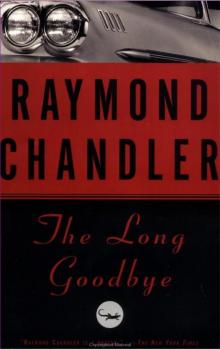 The Long Goodbye pm-6
The Long Goodbye pm-6